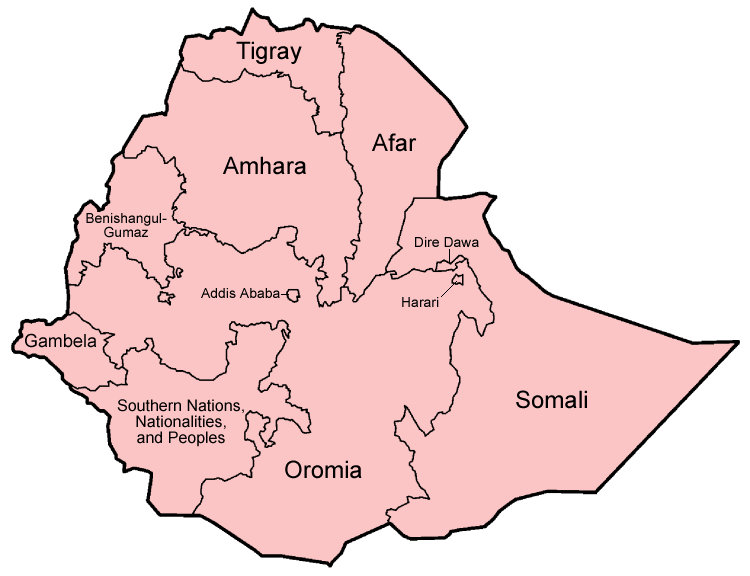
Since November of 2020, Ethiopia has been consumed by the ongoing conflict between the national government and rebels from the northernmost part of the country. This conflict however, has had a wide reaching effect over the rest of the large African nation. Once filled with hope of reform, Ethiopia’s recent developments have led to a regression in the rights and freedoms of those in the country as the government hopes to end the conflict and clamp down on further unrest. The recent unrest in Ethiopia has led to increased authoritarian tendencies in a nation that once had the promise of reform and democracy.
In 2018, anti-government protests erupted in Ethiopia, causing Prime Minister Desalegn to resign. He was then replaced by Abiy Ahmed, a young, charismatic leader looking to bring reform and unity into Ethiopia’s government. A year later, he would gain international acclaim for his peace settlement with Eritrea, which culminated in him winning the 2019 Nobel Peace Prize. However, only two years later, Ethiopia is in a new conflict as Abiy’s government is entrenched in a brutal confrontation with the Tigray People’s Liberation Front (TPLF), a paramilitary group from the Tigray region of the country.
Ethiopia is very ethnically diverse. The country is composed of 90 different ethnic groups based in several different regions of the country. The Tigrayan people inhabit the northernmost portion of the country and make up around seven percent of the population. Despite this, the TPLF dominated the national government up until 2012. After Abiy’s ascension to prime minister, tensions between the national government and the TPLF would culminate in September of 2020 as Tigray held regional elections against the orders of the federal government. This tension would soon turn to violence as clashes began between government forces and the TLPF. As the conflict has continued, there has been substancial evidence of atrocities being committed and there is evidence of genocide in the Tigray region.
The conflict in Tigray has been marked for the violation of human rights in the conflict, as combatants engage in extrajudicial killings and massacres. This is also evident in Ethiopian Defense Force’s use of drones that have resulted in civilian casualties, marking just how high the violence is in the region. The violence in Tigray demonstrates a large increase of human rights violations in the nation, which is incompatible with any sense of positive reform that Abiy championed before the conflict. It is essential for the Ethiopian government to prioritize human rights of those affected by the conflict in the Tigray region.
However, violence in the Tigray region is not the only issue facing the nation. The Ethiopian government has taken authoritarian actions that bring it further from democratic reform. As the conflict with Tigray rages, Abiy and the Ethiopian government have taken measures that reduce the rights of Ethiopians. One of which is press freedom being restricted. Authorities began to arrest journalists after a state of emergency was declared in November 2021, some of whom worked for an Ethiopia Broadcasting Corporation radio service based in the Tigrinya language. These actions severely inhibit ethnic minorities ability to obtain information in their own language. These actions have resulted in Ethiopia becoming one of Africa’s leading jailers of journalists. These actions mean dire consequences for press freedom, and civil liberties in the country, and further evidence of Ethiopia descending into authoritarianism.
Furthermore, Abiy’s government has taken harsh actions against peaceful protests against the conflict. Protests were banned and deemed as “illegal and unnecessary” with authorities using physical force to disperse protestors. Protesting government action became much more dangerous, as responses to the protests became much more violent. Inhibiting the ability to protest is not the only way opposition in Ethiopia has been combated. Many opposition leaders, like journalists, were arrested. Only recently have opposition leaders been released from prison after fourteen months of conflict. The Ethiopian government is continuing to use common methods in the typical authoritarian playbook as they suppress the freedom of assembly for opposition groups
Arresting opposition leaders and journalists as well as banning the ability to protest peacefully are all common actions taken by authoritarian regimes, and is an important example in how Ethiopia has regressed in it’s freedoms during the Tigrayan conflict. Ethiopia, a country which once had the promise of becoming a democracy, has fallen into a much more authoritarian state under the conflict, and there are doubts if the country can make any substantial progress towards democracy after a bloody conflict. As the Tigray conflict begins to wane and peace may be on the horizon, there may be some optimism for Abiy to prioritize the reforms he once promised before the conflict with Tigray began. As mentioned previously, political opponents were recently freed from prison, but their ability to check Abiy’s power will be extremely uphill since the recent election left his party with 410 of the 436 seats in the federal parliament. However, this election was boycotted by several opposition parties, and the US described it as “severely flawed.” As Ethiopia emerges from its conflict, it is important that Abiy and the rest of the government work to reinstate and increase the rights of those in the nation so that they can begin the process of democratization. It will certainly be a challenge for a nation fractured by ethnic conflict to unify, but it is essential that all people of Ethiopia, regardless of ethnicity, are able to enjoy civil liberties and participate in a democratic system with free and fair elections.

0 Comments